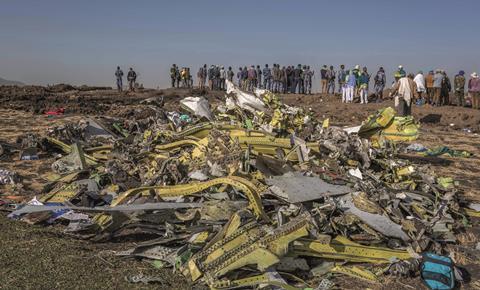Attorneys for relatives of 737 Max crash victims are urging a US federal judge to reject a US Department of Justice (DOJ) request to dismiss the criminal fraud trial against Boeing.
Families’ lawyers are also asking federal judge Reed O’Connor to assign a special prosecutor to continue the case, citing the DOJ’s interest in avoiding a trial.
The requests, filed on 18 June with US District Court for the Northern District of Texas, come after the DOJ last month reached a non-prosecution agreement (NPA) with Boeing.

DOJ lawyers then asked the judge to dismiss the trial, saying the NPA will deliver a quicker outcome and possibly more public benefit than a trial.
The NPA calls for Boeing to pay $1.1 billion, including a $243.6 million criminal fine, $444.5 million in compensation to crash-victims’ beneficiaries and $455 million in efforts “to strengthen the company’s compliance, safety and quality problems”.
“The proposed plea deal is not only deceptive but morally reprehensible because it fails to hold Boeing accountable for killing 346 people,” says Paul Cassell, who is among attorneys representing victims’ relatives.
Boeing declines to comment.
The lawyers argue the NPA fails “to reflect the fact that Boeing criminally caused the deaths of the crash victims”. Compensation payments appear “designed to persuade” families to support a deal letting Boeing “essentially buy its way out of a criminal conviction”, they say in court filings.
Also, because the DOJ and Boeing already signed the NPA, the DOJ appears contractually prohibited from pursuing the case further even if the judge rejects the motion to dismiss, they add.
The victims’ attorneys are asking the judge to declare parts of the NPA void and, if necessary, to appoint a special prosecutor to continue the case. Special prosecutors are typically appointed to handle cases where the DOJ has a conflict of interest.
The duelling court filings continue what has been a multi-year case against Boeing.
In 2021, the DOJ charged the company with defrauding the Federal Aviation Administration during the 737 Max’s certification.
Investigators traced two crashes – that of a Lion Air jet in 2018 and an Ethiopian Airlines jet in 2019 – partly to a flight-control system that put both aircraft into dives from which the pilots did not recover. The crashes killed 346 people.
Boeing initially sidestepped prosecution by signing a deferred prosecution agreement, but the DOJ tore up that deal after a manufacturing problem led to the inflight failure of a 737 Max 9’s mid-cabin door plug in January 2024.
Then last July, Boeing pleaded guilty, but judge O’Connor rejected the plea due to concerns including about a compliance-monitoring requirement, setting the stage for a trial.


























